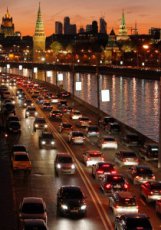 Sergei Shoigu, the newly appointed governor of the Moscow Region, recently proposed that Russia move its capital to Siberia. Sergei Shoigu, the newly appointed governor of the Moscow Region, recently proposed that Russia move its capital to Siberia.
Shoigu, a native of the Buddhist majority republic of Tuva, just north Mongolia, may have been playing to his home audience.
The idea was immediately squelched, and the Moscow regional assembly dutifully approved Shoigu’s appointment to run Russia’s richest region.
I have visited planned capitals on four continents. The idea of taking a capital out of an old city is a good one – and it works!
I first visited Brasilia in 1976 when red dust marked the walls of Oscar Niemeyer’s futuristic government buildings. Brasilia was a bold statement by the leaders of a people who had clung to the Atlantic coast for five centuries. By moving the capital 1,200 kilometers into the interior, Brazil’s leaders refocused the nation toward its western frontier. Half a century after the move, Rio de Janeiro has recovered from the loss of its capital status – and is far better off without it.
Similarly, the construction of Islambad in the 1960s drew Pakistan’s focus away from the coast, where the first capital was located, in Karachi. Ditto Abuja. By creating a new capital in Nigeria’s interior, Africa’s largest nation has drawn economic activity out of Lagos, on the coast. Both are reasonably functional capitals in fairly chaotic countries.
By moving Russia’s federal capital to Novosibirsk, Russians would finally take their eastern vocation seriously. A few years ago, China displaced Germany as Russia’s biggest trading partner. If Peter the Great founded St. Petersburg as Russia’s “Window on the West”, Vladimir Putin could elevate Novosibirsk to Russia’s “Window on the East.”
Founded in 1893 at the site of the Trans-Siberian railroad crossing of the River Ob, Novosibirsk has grown from wilderness settlement to major scientific center with 1.4 million inhabitants, Russia’s third largest urban population.
Around the world, three other successful capitals were built to defuse rivalries among existing big cities.
Washington was established defuse the rivalry among New York, Philadelphia and Boston. In Canada, Ottawa was developed as a linguistic neutral capital, midway between English-speaking Toronto and French-speaking Quebec City. In Australia, Canberra was built a century ago as an alternative to favoring Sydney or Melbourne. It’s a pleasant, livable city where kangaroos actually jump around on lawns.
By moving its capital to a third city, Russia would lessen the huge imbalance between Moscow, now a virtual city state, and St. Petersburg, the neo-classical planned capital spurned by the Soviets.
Moving Russia’s capital to Novosibirsk, would have another fringe benefit – easily half of federal employees would refuse to move to Siberia, helping Vladimir Putin meet his stated goal of cutting bloated federal payrolls.
But the main reason for moving the federal government out of Moscow is the capital’s creeping traffic paralysis.
With 800,000 new cars hitting the streets of Moscow every year, streets are slowly seizing up. Last year, average speeds slowed by 15 percent inside the Garden Ring, which defines the city center.
Today, the average Muscovite spends three hours commuting to and from work each day. One snow day last winter, 3,000 kilometers of Moscow streets and “highways” were locked in a massive traffic jam.
It took a visitor, Lloyd Blankfein, chief executive officer of the Goldman Sachs Group, to state the obvious: Moscow’s traffic jams are a big obstacle to turning the capital into a financial hub.
Below ground, in the Moscow metro, things are not much better.
Last year, about 4 million people rode the Moscow subway system every workday – about 20 percent over capacity.
Now at rush hour, there 5.6 people per square meter of metro floor space. Sardines get more space in their cans – and they’re packed in oil!
Moscow’s government is responding by building 70 new stations and increasing the track network by 50 percent, to 450 kilometers by 2020. But it’s unclear if the city has the engineering capacity to meet these goals. Last week saw the reopening of a key line transfer point, at Park Kulturii. It took city workers 15 months to install new escalators and turnstiles with plastic glass doors.
In another effort to curb the use of cars, Moscow has announced that free street parking in the city center will end in September. Rates will be light – 50 rubles an hour – or $1.70. By comparison, midtown Manhattan garages often charge $8 for the first hour.
To save 50 rubles, I can see oligarch shoppers ordering their drivers to cruise the Bentleys, further contributing to limo-gridlock.
The next step should be to defend pedestrians with an updated version of the technology used 70 years ago to keep Nazi tanks. To protect sidewalks from parked cars, all central Moscow sidewalks should be defended with steel poles, the contemporary equivalent of anti-tank traps.
But the core problem remains: half of Moscow’s jobs are in the city core.
Rather than taking the bold leaps followed by leaders of nations as diverse as Australia, Brazil, Pakistan and Nigeria, the Kremlin is settling for a half step.
In April, as outgoing President Dmitry Medvedev pushed hard to polish his legacy, he announced that a series of federal agencies will move out of central Moscow.
Their destination: to new territories created by expanding Moscow’s border to the southwest.
In case this move is seen as too bold, he said that a priority project will be to upgrade Kaluzhskoye Shosse. This highway will be redesigned so drivers can speed down the 25 kilometer stretch from new government ministries to the Kremlin – without traffic lights.
|
